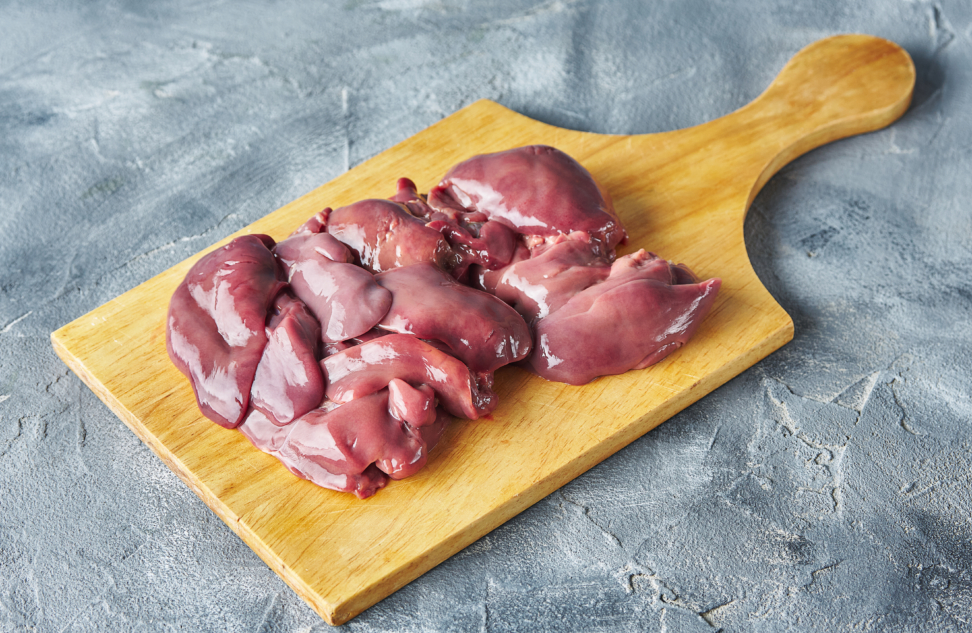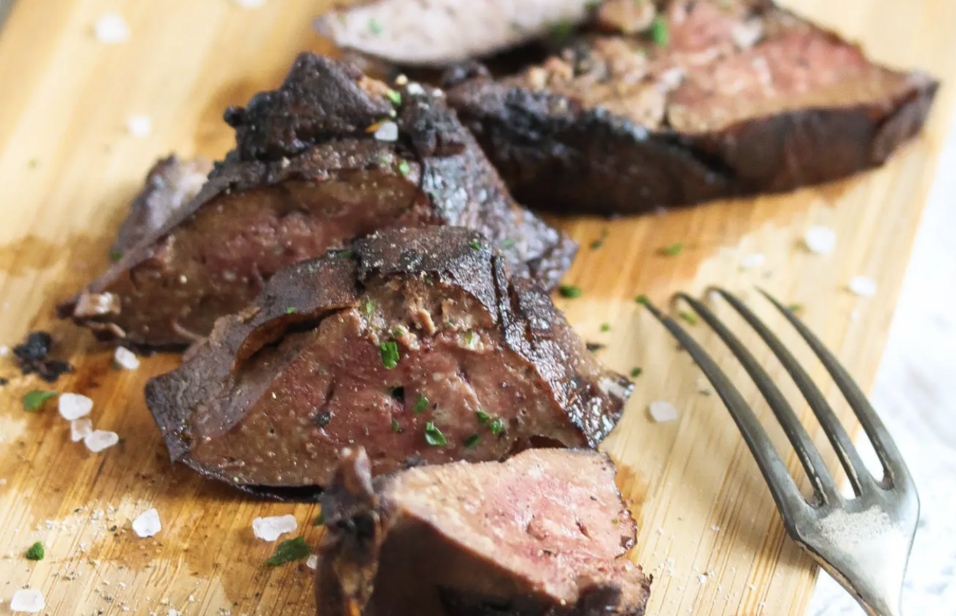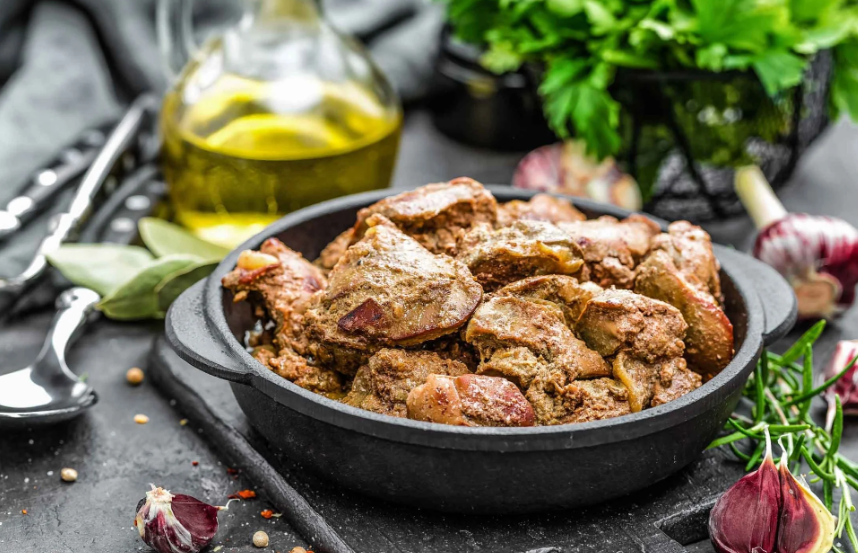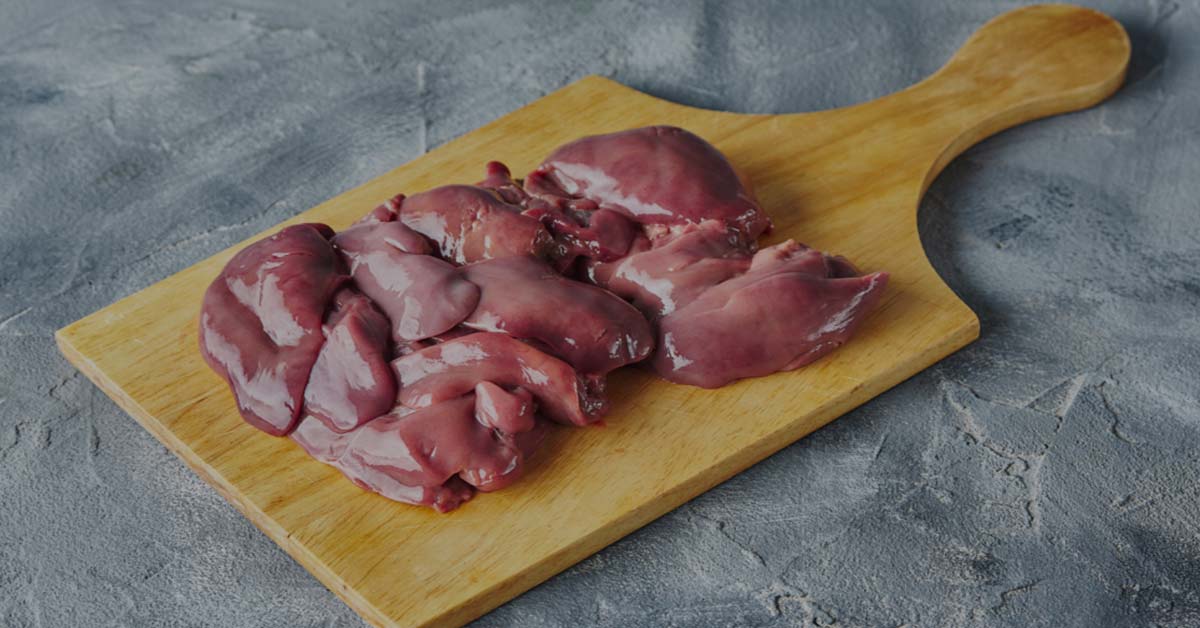This Article is Approved By » Esther Howard (Nutritionist) & Dr. Jane Cooper (Expert Dietitian)
Turkey liver, often overshadowed by its more famous counterparts, deserves a spotlight of its own. This humble organ meat packs a powerful punch when it comes to nutrition. So, is turkey liver good for you?
In this article, we’ll delve into the world of turkey liver, exploring its remarkable health benefits, nutrient content, and easy-to-follow recipes.
Whether you’re a seasoned food enthusiast or a curious beginner, read on to discover why turkey liver should be on your plate.
Is Turkey Liver Good for You?
Yes, turkey liver is good for you. It is one of the most nutrient-dense foods on earth. Turkey liver is a powerhouse of nutrients, including vitamin A (retinol), various B vitamins, selenium, heme iron, complete proteins, and nourishing animal fat.
It is particularly beneficial for individuals with iron-deficiency anemia due to its high iron content. However, it’s important to consume it in moderation as it’s high in cholesterol and saturated fat. Overconsumption could lead to vitamin A toxification.

Turkey Liver Nutrition
Turkey liver is a highly nutritious organ meat that provides various essential nutrients beneficial for overall health. Below is a detailed breakdown of its nutritional information based on a 3-ounce (85g) serving:
Macronutrient Profile:
- Calories: 161
- Total Fat: 7g
- Saturated Fat: 2g
- Trans Fat: 0g
- Cholesterol: 551mg (184% of Daily Value)
- Sodium: 83mg
- Total Carbohydrate: 0g
- Dietary Fiber: 0g
- Total Sugars: 0g
- Protein: 23g
Vitamins:
- Vitamin D: Information not provided.
- Vitamin A: Excellent source
- Vitamin A IU: Excellent source
- Riboflavin (Vitamin B2): Excellent source
- Niacin (Vitamin B3): Excellent source
- Pantothenic Acid (Vitamin B5): Excellent source
- Vitamin B6: Excellent source
- Vitamin B12: Excellent source
- Choline: Excellent source
Minerals:
- Calcium: 16mg (1% of Daily Value)
- Iron: 2mg (8% of Daily Value)
- Potassium: 130mg (3% of Daily Value)
- Zinc: Excellent source
- Copper: Excellent source
- Selenium: Excellent source
- Phosphorus: Good source
Fats and Fatty Acids:
- Saturated Fat: Low content
- Trans Fat: Present
- Cholesterol: High content
Proteins and Amino Acids:
- Protein: Very high content
- Essential Amino Acids: Contains essential amino acids critical for building protein, with a Protein Quality Score of 100%
- Limiting Amino Acid: Valine
Carbohydrates and Sugars:
- Total Carbohydrates: None
- Dietary Fiber: None
- Total Sugars: None
Additional Information:
- Proportions of Macros: Very high protein, moderate fat, zero carbs
- Macro Profile Similarities: Similar to the recommended protein powder
- Some Foods Equivalent to 100g of Turkey Liver: 4.5 eggs, 1 chicken breast, or 1.9 cups (525g) of black beans

Turkey liver serves as an excellent source of several vitamins, including Vitamin A, B vitamins (Riboflavin, Niacin, Pantothenic Acid, Vitamin B6, Vitamin B12), and minerals like Zinc, Copper, Selenium, and Iron. It also provides a significant amount of high-quality protein and essential amino acids necessary for various bodily functions, making it a valuable addition to a balanced diet. However, its high cholesterol content should be considered for individuals with specific dietary restrictions or health concerns.
Nutritional Benefits of Turkey Liver
Turkey liver is like nature’s multivitamin—a single serving provides an impressive array of essential nutrients. Let’s break down its nutritional profile:
Vitamin A (Retinol)
Turkey liver reigns supreme as the food with the highest concentration of vitamin A.
A mere 100 grams of turkey liver delivers 2410% of your recommended daily value (RDV) of vitamin A. This essential fat-soluble nutrient is crucial in maintaining healthy vision, supporting the immune system, and promoting skin health.
However, a word of caution: due to its vitamin A richness, enjoy turkey liver in moderation to avoid vitamin A toxification.
Vitamin B12
Turkey liver is a superstar in the vitamin B12 department, providing 2416% of your RDV per 100 grams.
Vitamin B12 is essential for nerve function, red blood cell production, and overall vitality. Incorporating turkey liver into your diet ensures you’re meeting your B12 needs.

Other B Vitamins
Beyond B12, turkey liver contains various B vitamins, including riboflavin (vitamin B2), niacin (vitamin B3), and vitamin B6. These vitamins are vital in energy metabolism, brain health, and maintaining healthy skin.
Iron and Heme Iron
Iron deficiency is a common concern, especially for those following restrictive diets. Turkey liver offers a generous 10.7 milligrams of iron per 100 grams.
Additionally, it provides heme iron, found in animal products, which is more readily absorbed by the body than non-heme iron from plant sources.
Selenium and Zinc
Turkey liver contains essential minerals like selenium and zinc. Selenium acts as a powerful antioxidant, supporting immune function and thyroid health.
Meanwhile, zinc contributes to resistant system maintenance, wound healing, and overall well-being.
Monounsaturated Fat
Approximately 30% of the fat in turkey liver consists of anti-inflammatory monounsaturated fat. This heart-healthy fat supports cardiovascular health and provides sustained energy.
Turkey Liver Taste
Turkey liver is generally considered to have a milder and sweeter taste than chicken liver. This is because turkey livers are typically smaller and contain less fat, which gives them a lighter flavor.
When cooked with onions and garlic, the natural bold taste of the liver is mellowed out, and delicious savory and sweet flavors are added.
Some recipes suggest sautéing turkey liver with red pepper flakes for a bit of heat and serving it with a sumac-flavored red onion and parsley salad for a refreshing contrast.
Another popular recipe involves cooking turkey liver with onions and apples and serving it with mashed potatoes. These combinations help to balance the liver’s strong, earthy, and metallic flavor.
Pan-Seared Turkey Liver with Garlic and Herbs Recipe
Now that we’ve established turkey liver’s nutritional prowess let’s put it to delicious use. Try this simple recipe:
Ingredients:
- 1 lb turkey liver
- 2 cloves garlic, minced
- 1 tablespoon olive oil
- Salt and pepper, to taste
- Fresh herbs (such as parsley or thyme), chopped
Instructions:
- Rinse the turkey liver and pat it dry with paper towels.
- Heat olive oil in a skillet over medium heat.
- Add minced garlic and sauté until fragrant.
- Season the liver with salt and pepper, then add it to the skillet.
- Cook for 2-3 minutes per side until browned and cooked through.
- Sprinkle with fresh herbs before serving.
Enjoy your flavorful and nutrient-packed turkey liver!
Turkey Liver Vs. Chicken Liver
Turkey liver and chicken liver are nutrient-dense foods full of vitamins and minerals. Here are some key differences between the two:
Taste and Texture
Turkey’s liver is generally milder and sweeter than chicken liver. This is because turkey livers are typically smaller and contain less fat, which gives them a lighter flavor.
Chicken livers, on the other hand, are larger and have a more robust, metallic taste. Turkey’s liver is much softer and more tender than chicken liver, which makes it easier to cook and eat.
Chicken liver is also softer than beef or pork liver, but it has a slightly coarser texture.
Nutritional Content
Both are an excellent source of protein, vitamins, and minerals, and they are both low in fat. However, turkey liver is slightly higher in iron and vitamin A, while chicken liver is higher in vitamin B12.
Turkey liver is the way to go if you’re looking for a milder, sweeter flavor and a softer texture. If you’re looking for a more robust, metallic taste and a coarser texture, chicken liver might be the better option. Ultimately, both are excellent choices for a nutritious and delicious meal.
The Key Takeaway
Turkey’s liver deserves a place at your table. Whether you’re a liver enthusiast or a curious newcomer, embrace this nutrient-dense superfood.
Remember to savor it in moderation, and let its vitamins, minerals, and nourishing properties contribute to your overall well-being. You may also explore 10 more superfoods and their benefits in another article.

